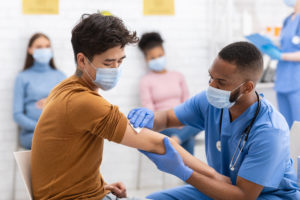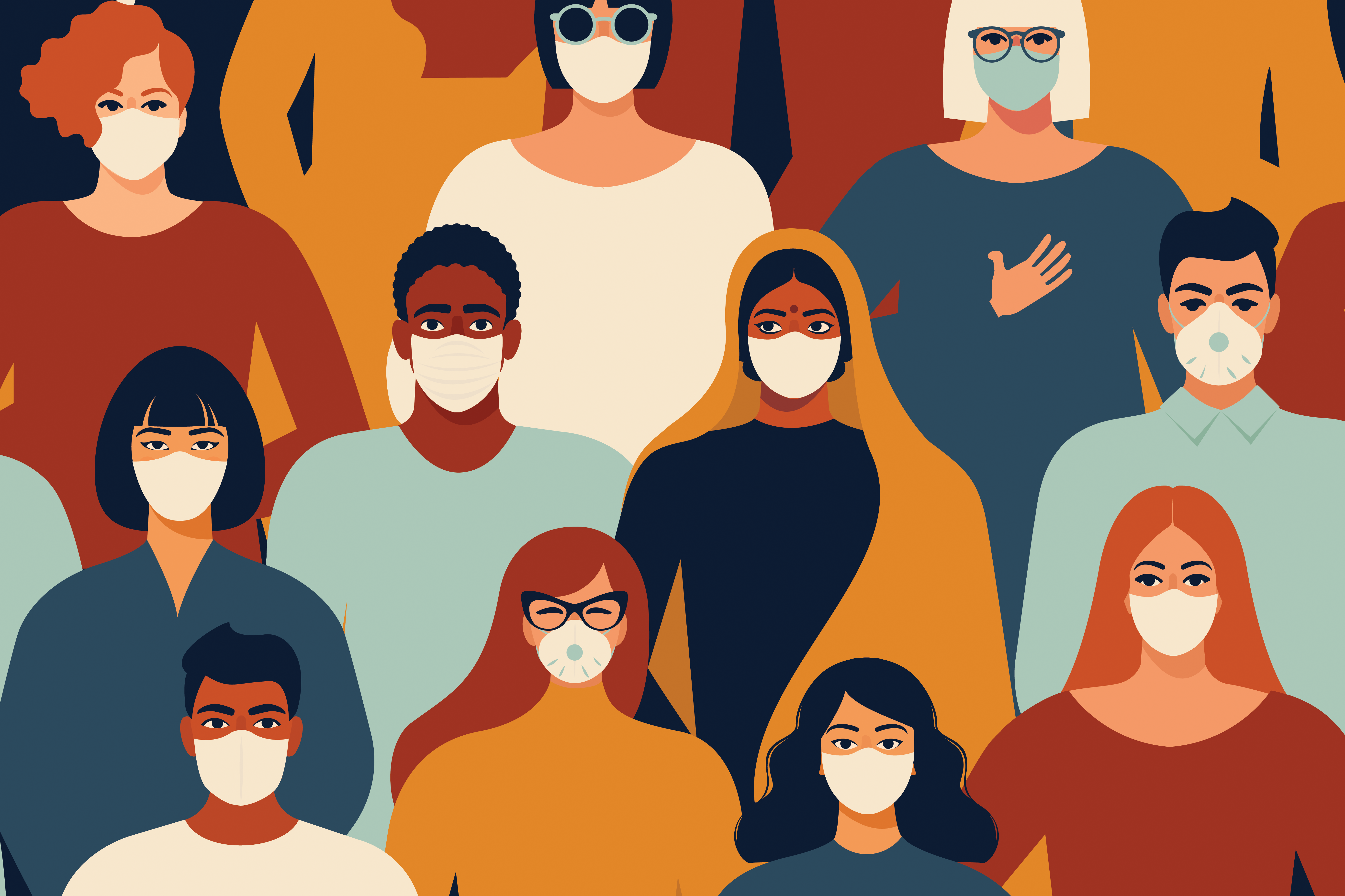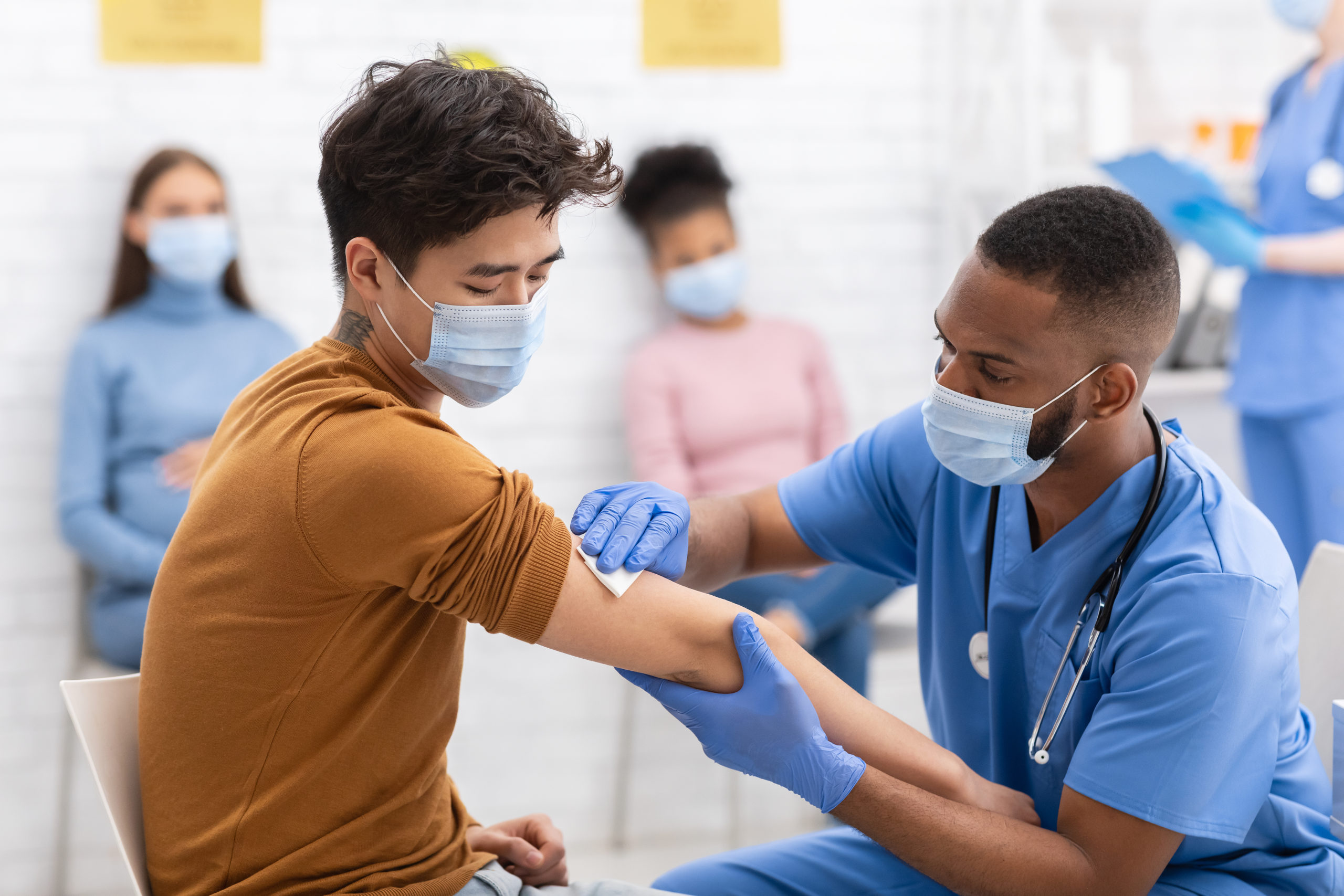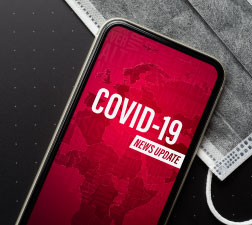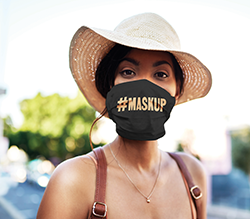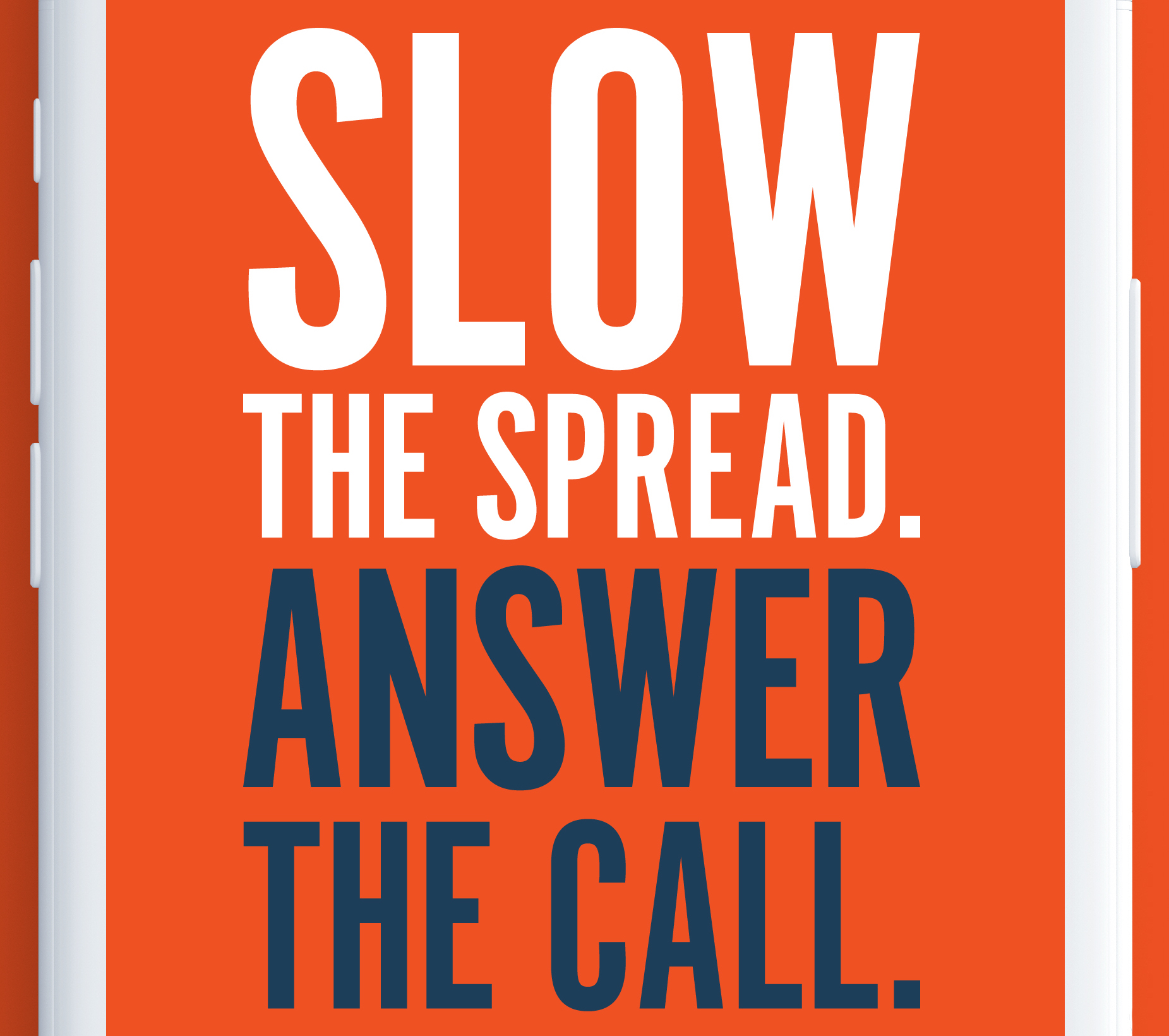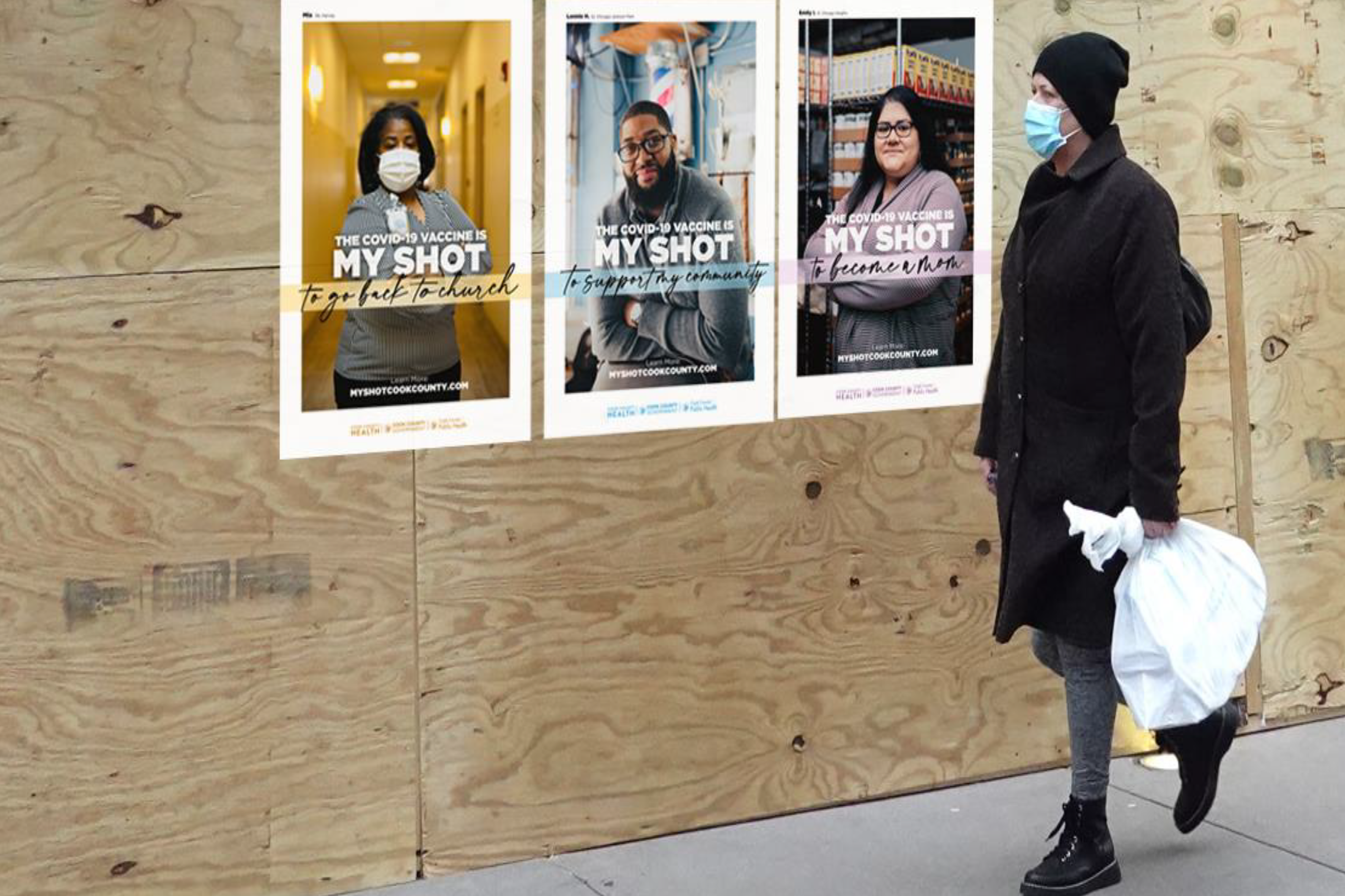The vaccinations will help keep you from getting COVID-19.
COVID-19 can have serious, life-threatening complications. If you get sick, you might spread the disease to friends, family, coworkers, and everyone around you.
If you’ve had the virus, you may have some natural protection, known as immunity, but we don’t know how long this protection lasts. The COVID-19 vaccinations will help protect you by creating an antibody response without having to experience sickness.
Wearing masks and social distancing help reduce your chance of being exposed to the virus or spreading it to others, but these measures are not enough. Vaccines will work with your immune system so it will be ready to fight the virus if you are exposed.
Cook County Department of Public Health (CCDPH) is making the COVID-19 vaccine available as soon as possible to people living and working in CCDPH’s jurisdiction of suburban Cook County. (Evanston, Oak Park, Skokie and Stickney Township have their own state-certified local health departments and are not part of CCDPH’s jurisdiction).
CCDPH Commitment to Equity
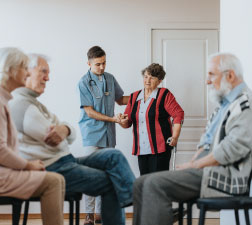 CCDPH is committed to an equitable distribution of vaccine, with an emphasis on communities that have been most dramatically impacted by COVID such as senior citizens and traditionally underserved populations.
CCDPH is committed to an equitable distribution of vaccine, with an emphasis on communities that have been most dramatically impacted by COVID such as senior citizens and traditionally underserved populations.
The CCDPH Equity Team uses these guiding principles when making allocation decisions:
- Provider site demographics in ICARE (including race and ethnicity)
- CCVI data + COVID-19 deaths + vaccine coverage rates
- Focus on 30 municipalities from Equity Plan
- Vulnerable populations served not included in CCVI score (undocumented, homebound, congregate settings)
- Vaccine Turnover (5-7 days)
- Phase Considerations (e.g. finishing up previous phase, good strategy for certain phases)
CCDPH understands that many people, and especially older adults, want to get vaccinated for COVID-19 as soon as possible.
There are two ways to sign up for vaccine:
- Visit vaccine.cookcountyil.gov
- Call 1-833-308-1988 , Monday through Friday, 7am to 7pm
COVID Vaccine FAQs
Getting the vaccine
How do I make an appointment?
vaccine.cookcountyil.gov is a site where people living, working, or receiving medical care in suburban Cook County can register for vaccine. Those who are eligible to be vaccinated at this time can schedule an appointment to receive vaccine if enough vaccine is available. Please note that the vaccine supply is still quite limited.
How will a patient be directed to a specific facility?
On the new site, residents will be given a list of facilities within a 15-mile radius. They can choose any of those locations at which to make appointments.
Can the identified facilities take walk-ins?
Each site requires an appointment. We are aiming to be as efficient as possible in our planning, so we are requiring patients to provide information when they make an appointment so the process of vaccination can happen as quickly as possible on site.
Will you need to provide proof of age if you are 65?
We are asking for identification and insurance information if you have them. The vaccine is free and you do not need to be insured to receive a vaccine. Any insurance information is used by the partner site for re-imbursement purposes. There will be no out-of-pocket fees.
Will you need to provide proof of occupation?
-
- Professional/work-related staff identification
- Professional license number or certificate
- Paystub from employer
- Signed letter from employer
- Uniform
- For family caregivers/unpaid home health – letter from an organization (e.g. Age Options) or physician indicating their role
Is the vaccine free?
Can I call to make an appointment?
Can the sites take walk-ins?
How will patients be notified for 2nd shots?
Can you be undocumented? Is a SSN required?
Will my personal information by shared with others?
Our health department will not share personal information with any other health departments or any other government or private entities. We will share more general information, such as changes in the number of people who are sick or and racial and other inequities, with the public and our partners.
How quickly will I be protected from COVID after receiving the vaccine?
Who will know if I get vaccinated?
Will you need to provide proof of age if you are 65?
Can I just get one of the vaccine doses?
Once I have the vaccine, do I still need to wear a mask and social distance?
Can I pick which vaccine I get?
Where can I get a vaccine?
How will the vaccine be distributed across suburban Cook County?
When can life return to normal?
Vaccine Safety
Is the vaccine safe?
All vaccines in Illinois will only be distributed when they are deemed safe. Both the Pfizer and Moderna have completed multiple stages of clinical trials.
The CDC, along with FDA and other federal partners, will use established safety systems to conduct heightened safety monitoring of COVID-19 vaccines. Additional safety measures include active surveillance using text messaging and web surveys from CDC, and enhanced passive surveillance through other data sources from healthcare facilities.
If a link is found between a side effect and a COVID-19 vaccine, public health officials will take appropriate action by weighing the benefits of the vaccine against its risks to determine if recommendations for using the vaccine should change and continuously monitor and evaluate safety thereafter.
Will a COVID-19 vaccine alter my DNA?
Messenger RNA vaccines—also called mRNA vaccines—are the first COVID-19 vaccines authorized for use in the United States. mRNA vaccines teach our cells how to make a protein that triggers an immune response. The mRNA from a COVID-19 vaccine never enters the nucleus of the cell, which is where our DNA is kept. This means the mRNA cannot affect or interact with our DNA in any way. Instead, COVID-19 mRNA vaccines work with the body’s natural defenses to safely develop immunity to disease. Learn more about how COVID-19 mRNA vaccines work.
At the end of the process, our bodies have learned how to protect against future infection. That immune response and making antibodies is what protects us from getting infected if the real virus enters our bodies.
Is the vaccine effective?
Pfizer has reported preliminary data that demonstrates their vaccine is 95% effective. Moderna has reported preliminary data that demonstrates their vaccine is 94.1% effective.
The CDC is working to make sure vaccine effectiveness assessments include diverse groups of people, such as healthcare personnel, essential workers, older adults, and those living in nursing homes, people with underlying medical conditions, racial and ethnic minority groups, and tribal nations. It is important to measure how well COVID-19 vaccines work in groups of people who are at increased risk of getting COVID- 19, as well as in those who are at increased risk of severe COVID-19 illness.
Has the vaccine been approved by the FDA?
The FDA granted Emergency Use Authorization of the Pfizer COVID-19 vaccine on Dec. 11, 2020. They will decide on the Moderna COVID-19 vaccine on Dec. 17, 2020.
What does Emergency Use Authorization (EUA) mean?
In an emergency, like a pandemic, it may not be possible to have all the evidence that the FDA would usually have before approving a drug, device, or a test. When there is a declared emergency, the FDA can allow the use of a product, like a vaccine, before full approval by issuing an Emergency Use Authorization or EUA.
After the requisite determination and declaration have been issued, and after feasible and appropriate consultations, FDA may issue an EUA only if FDA concludes that the following four statutory criteria for issuance have been met.
- Serious or Life-Threatening Disease or Condition
- Evidence of Effectiveness
- Risk-Benefit Analysis
- No Alternatives
More information on EUA is available on the FDA website .
How was the vaccine developed so quickly?
The COVID-19 vaccine was developed through the Health and Human Services’ Operation Warp Speed. No safety measures were cut in its design, testing or manufacturing. A focus was placed on early manufacturing and the use of new technologies so as soon as the vaccine was deemed safe by the appropriate agencies, distribution could begin. More information about Operation Warp Speed is on the HHS’ website.
Who was represented in the clinical trials?
Pfizer’s clinical trial enrolled 43,000+ participants with 42% globally having racially and ethnically diverse backgrounds. Moderna’s 30,000 trial included participants from minority communities, including 6,000 Hispanic and 3,000 Black participants. AstraZeneca’s initial trial data included participants from Brazil and the United Kingdom while the company continues to conduct trials in South Africa, Kenya, Latin America, Japan, Russia and the United States.
CCDPH’s Vaccination Distribution
How will the vaccine be distributed across suburban Cook County?
CCDPH will follow federal and state guidelines for distributing the vaccine. Distribution prioritization is based on risk, not geographic location. However, all hospitals across the city will receive doses of the vaccine based on their healthcare workforce and patient populations. Access to the vaccine will always be looked at through an equity lens.
How is an essential worker defined?
There are 16 critical infrastructure sectors identified by the Cyber and Infrastructure Security Agency (CISA) whose assets, systems, and networks, whether physical or virtual, are considered so vital to the United States that their incapacitation or destruction would have a debilitating effect on security, national economic security, national public health or safety, or any combination thereof. Additional information on these sectors can be found on the CISA website .
COVID-19 Vaccination Phases and Plans
CCDPH has expanded to Phase 1b of the Vaccination Plan as of January 25. We will continue to prioritize any remaining Phase 1a individuals.
The expansion to Phase 1b includes members of the general public for the first time – about 375,000 people aged 65 and over. The 65+ population represents a majority of people within phase 1b. Phase 1b also includes police, firefighters and other essential workers, such as manufacturing employees and grocery store workers – a group estimated at 270,000.
CCDPH has released a registration form for community organizations (such as adult daycare, community center, employer, senior housing, shelter, place of worship, or other large institution) that would like to work with CCDPH to organize on-site vaccinations. A mobile vaccination unit may be sent to your site to run an onsite vaccination clinic to vaccinate ONLY pre-registered staff/residents/clients. Given that vaccine supply is highly limited, CCDPH will prioritize requests based on COVID-19 impact and vulnerability.
- Employ or serve individuals in Phase 1b with limited resources or access to care within suburban Cook County (excluding Evanston, Skokie, Oak Park, or Stickney Township).
- Have a secure space to conduct vaccination while maintaining social distancing
- Support clinics for COVID-19 vaccination doses 1 and 2
- Support setting up appointments and pre-register staff/clients
To register, please visit the Community Vaccination Program website, and click the “Organization Sign-Up” link on the right side of the menu bar.
Community Vaccine Sites
Who are the community vaccination sites for?
The community vaccination sites are for people living or working in suburban Cook County, who are in the Phase 1a or Phase 1b vaccination groups. This includes people over the age of 65, essential workers, healthcare personnel, and people living in long-term care facilities. For more details about who is eligible for vaccination, please see this page.
Is an appointment required?
Yes, an appointment is required. Cook County Health will release new appointments every week for the following week based on the amount of vaccine on hand. Based on current vaccine supply, approximately 15,000 appointments will be released on Jan. 22 to cover all Cook County Health sites. Please note that there is not enough vaccine at this time to vaccinate everyone in the Phase 1b.
How do I make an appointment?
Please visit vaccine.cookcountyil.gov. Those who are eligible to be vaccinated at this time can schedule an appointment to receive vaccine if enough vaccine is available. Please note that there is not enough vaccine at this time to vaccinate everyone in the Phase 1b.
Where are the community vaccination sites located?
The first community vaccination sites have opened at the Tinley Park Convention Center and Triton College. In the weeks ahead, pending vaccine availability, Cook County expects to open additional large-scale sites.
Can my organization partner with CCDPH to host a vaccination clinic?
To qualify for mobile team assistance, you must:
- Employ or serve individuals in Phase 1b with limited resources or access to care within suburban Cook County (excluding Evanston, Skokie, Oak Park, or Stickney Township).
- Have a secure space to conduct vaccination while maintaining social distancing
- Support clinics for COVID-19 vaccination doses 1 and 2
- Support setting up appointments and pre-register staff/clients
To register, please visit the Community Vaccination Program website, and click the “Organization Sign-Up” link on the right side of the menu bar.
CCDPH Vaccine Distribution Plan
Phase 1
- Supply may be constrained
- Tightly focus vaccine administration
- Administer vaccine in closed settings best suited for reaching initial critical populations (e.g. workplaces and other vaccination sites)
- 1a – Health care workers, beginning with hospital based, highest risk of exposure
- 1a – Long-term care facility (LTCF) staff and residents
- 1a – Unaffiliated healthcare workers including EMS personnel
- 1b – (ACIP recommendations pending) Essential workers, including first responders, corrections officers, education sector, food and agriculture, utilities, transportation
- 1c – (ACIP recommendations pending) High risk adults
- Phase 1b: Other essential workers and people at higher risk of COVID-19 illness, including people
Phase 2
Key factors and likely strategies
- Likely sufficient supply to meet demand
- Expand beyond initial populations
- Use a broad provider network and settings, including:
- Healthcare (doctors’ offices, clinical)
- Commercial sector (retail pharmacies)
- Public health venues (clinics, mobile clinics, FQHCs and community settings)
Populations of Focus
- Expand the vaccination strategy to provide COVID-19 vaccine in a manner that allows for equal access to the vaccine to:
- Phase 1 critical population members who were not vaccinated in Phase 1
- Remaining critical population groups
- General population
Phase 3
Key factors and likely strategies
- Likely sufficient supply
- Open access to vaccination
- Administer through additional private partner sites
- Maintain public health sites where required


Resources
Updated March 19, 2021, 1:54 PM

